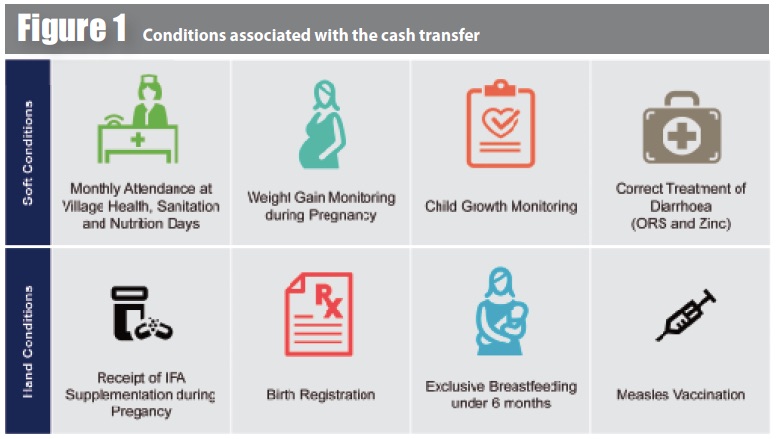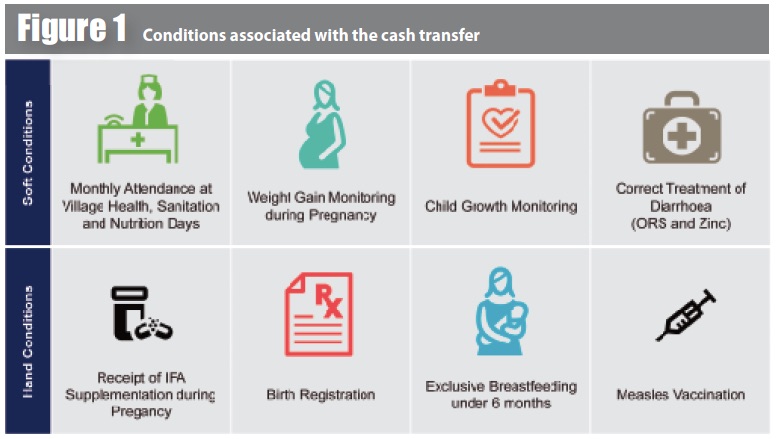Action Against Hunger/Action Contre la Faim: Promoting a comprehensive nutrition-security approach and organisational culture to enhance nutrition-sensitive programming
By Maureen Gallagher and Julien Morel
Maureen Gallagher is Senior Nutrition & Health Advisor with ACF-USA
Julien Morel is Senior Nutrition Security and Social Protection Advisor, ACF-France
Location: Global
What we know: The multisectoral nature of immediate and underlying factors leading to undernutrition calls for coherent and coordinated multisectoral responses that transcend sectors.
What this article adds: Since 2011, ACF has engaged in an institutional process to better align its interventions with nutritional outcomes. In 2014, an organisational Nutrition Security policy was developed to provide a framework for action that prioritises high burden areas and nutritionally at risk populations. Initiatives to support rollout have included awareness raising, capacity building, documentation of experiences, research, and guidance development. Outstanding challenges to full implementation are lack of evidence of effectiveness and cost-effectiveness and complexities in measuring effectiveness, limited time, energy and motivation to interact across sectors, and limited time for analysis within the humanitarian response cycle. A global learning review is planned for 2016.
Despite a renewed focus on nutrition by the international community and some achievements in agricultural productivity, basic health access and education worldwide, the progress on reducing undernutrition has been comparatively slow. While international and national commitment has grown, along with funding and civil society attention, this has not yet been translated into sufficient progress in reducing the prevalence of undernutrition globally. Improvements in nutrition still represent a massive challenge.
During the last decade, scientific knowledge around the most efficient and cost-effective ways to tackle undernutrition has progressed: the publication of The Lancet Series 2008 and 2013 on Maternal and Child Undernutrition identified a series of effective nutrition-specific interventions, which, if implemented at scale at the right time, could reduce undernutrition-related mortality and disease burden by 25% in the short term (The Lancet, 2008 and 2013) As a follow up, the international movement Scaling Up Nutrition (SUN) called for the scale-up of those nutrition-specific interventions, as well as an increase in the design of more nutrition-sensitive strategies to tackle the underlying causes of undernutrition.
To accelerate the progress being made, nutrition-sensitive programmes tackling key immediate and underlying drivers of undernutrition are needed in addition to the immediate impact of nutrition-specific and curative approaches (Ruel & Hoddinott, 2008). Investment in nutrition-sensitive programmes can play a pivotal role in preventing undernutrition and impaired child development that cannot be resolved by a scale-up of nutrition-specific interventions alone. In addition, it is recognised that the multi-sectoral nature of immediate and underlying factors leading to undernutrition calls for coherent and coordinated multi-sectoral responses that transcend traditional sector boundaries in order to be effective and translate into improved nutritional outcomes.
In order to increase the organisation’s impact on undernutrition, curatively and preventively, Action Against Hunger | ACF International (ACF) has, since 2011, engaged in an institutional process to better align its interventions with nutritional outcomes. One key action of this process has been the development, in 2014, of an organisational Nutrition Security policy (ACF, 2014) to provide a comprehensive and consolidated framework for mobilisation and action in the fight against undernutrition. The policy aims are:
- To highlight issues and challenges, and define concepts around nutrition security;
- To define the organisation’s vision and position for a systematic nutrition-oriented approach·
- To provide overall principles, ambitions and commitments to apply this vision at institutional, strategic and programmatic levels.

Aiming for a long-term, sustainable and wide-scale impact on undernutrition, the Nutrition Security policy calls for adopting a multi-sectoral approach and acting in an integrated way on all causal context-specific factors leading to undernutrition. It also promotes multi-level response strategies, linking curative, preventive and longer term structural actions, to act jointly on existing immediate and underlying causes of undernutrition, as well as mid to long-term risks and structural factors. It is based on a set of core programmatic and institutional principles (see Figure 2) defined to maximise the organisation’s impact on undernutrition.

The policy calls for prioritising high-burden areas and nutritionally at-risk populations. The priority target populations are communities, families and individuals who are most affected, vulnerable to or at risk of undernutrition. While it is recognised that the focus should be placed on the 1,000-days window of opportunity, preventing undernutrition during this critical period often requires engaging with other relevant members of the family and community at different periods of the life cycle. The policy also calls for programmes to be defined based on a comprehensive, contextual nutrition situation and response analysis, involving all relevant sectors, in order to gain a holistic perspective of the needs, risks and causes and the best way to answer these in an integrated manner. Furthermore, response strategies and interventions should aim for nutrition impact and incorporate specific, explicit and attainable nutritional objectives, targets and indicators. The policy also stresses the need to sustainably influence the nutrition security of populations, alongside addressing the immediate and underlying causes of undernutrition.
To support the translation of the Nutrition Security policy and principles into practice, a number of initiatives were implemented. These aimed to promote and embed a nutrition security culture across the organisation, targeting technical as well as management personnel, at headquarters and country levels concomitantly. The institutionalisation strategy was defined, overseen and coordinated by an internal, cross-sector working group dedicated to promoting and strengthening the nutrition security approach and interventions internally and externally. The initiatives are summarised in Box 1.


* Resilience refers to the capacities of people, communities and the systems on which they depend to resist, absorb, cope and adapt when exposed to a hazard or a set of hazards - while preserving, restoring or enhancing their food and nutrition security. ACF, 2012, Enhancing Climate resilience and food and nutrition security.
 Despite these investments in institutionalisation and operationalisation of a systematic nutrition security approach in programming, a number of challenges and limitations remain, preventing the complete application of a comprehensive nutrition security approach. They relate for instance to:
Despite these investments in institutionalisation and operationalisation of a systematic nutrition security approach in programming, a number of challenges and limitations remain, preventing the complete application of a comprehensive nutrition security approach. They relate for instance to:
- Lack of evidence of effectiveness and cost-effectiveness: There is very little evidence of preventive and multi-sectoral approaches on nutrition, which limits the support that can be given to designing interventions based on clear and agreed criteria and principles to maximise nutritional outcomes.
- Complexity to measure effectiveness: There is a lack of simple, easy-to-use methods and indicators to measure nutritional effects and impact of nutrition-sensitive interventions in a systematic way. Project outputs monitoring and reporting, within organisations, the cluster system or for donor reporting remain highly sectoral, preventing an understanding of the benefits and achievements of more integrated interventions.
- Limited time, energy and motivation required to interact: Engaging in cross-sector dialogue and programming is more complex than the traditional siloed approach. This requires strong leadership and support from management, as well as clear incentives for stakeholders who need to invest in lengthy dialogue and interaction. They need to be convinced (based on evidence) and understand the direct benefit of any joint effort in order to be fully engaged. The premium of time required for multi-sector coordination is even more critical in emergency response.
- Limited time for response analysis: In the humanitarian project cycle there is limited time for investment in assessing the situation and designing the response. This prevents a holistic analysis of the undernutrition which would entail cross-fertilisation of ideas among multiple stakeholders from different sectors and drawing on community experience and know-how. While identification of theories of changes or programme impact pathways is a recognised good practice to support adequate programme design, this type of pathway analysis is very often not undertaken.
- Existing funding mechanisms: Funding for fully integrated, multi-sectoral response to undernutrition remains limited, with mechanisms still not adapted. Funding approaches remain very sector-specific and rarely lead to financing projects and programmes which seek to tackle the identified factors leading to undernutrition in a specific setting simultaneously and comprehensively.
Institutionalisation and operationalisation of the Nutrition Security policy is currently ongoing. It is too early to formally assess the effectiveness or actual buy-in, increased capacity and changes in programming to date, but qualitative analysis and case studies indicate an evolution in thinking and action, with an increasingly stronger focus on comprehensive undernutrition responses in country strategies and programmes. Examples are provided in this issue of Field Exchange, where ACF programmes have incorporated a nutrition security approach, their results and lessons learnt. These examples reflect how institutional policy and processes can lead to shifts in approaches and drive stronger multi-sectoral interventions and outcomes. The Nutrition Security policy has led to an increased understanding, knowledge and appetite for nutrition-sensitive approaches among ACF staff and is increasingly being reflected in intervention design and implementation, as reflected in these examples.
A more global learning review is expected in 2016 to examine in greater depth how the nutrition security approach has influenced ACF programming and the extent to which this has impacted nutritional status of programmes participants.
For more information, contact: Julien Morel or Maureen Gallagher.
References
ACF International, (2014). Nutrition Security Policy. A common multisectoral understanding and approach to address undernutrition. www.actioncontrelafaim.org
The Lancet, (2008 and 2013) Maternal and Child Undernutrition, Special Series.
Mutegi, K. and Korir, J. (2016). Nutrition-sensitive multi-sectoral planning: Experience from West Pokot County, Kenya Nutrition Causal Analysis response planning. Field Exchange 51, January 2016. p149. www.ennonline.net/fex/51
Ruel M., & Hoddinott J., (2008). Investing in Early Childhood Nutrition. IFPRI Policy Brief 8.
Van Klinken, M., Parnaby, M., Acosta, P. and Chalimbaud, J. (2015). Building a case for causality through the NCA approach in Satkhira, Bangladesh.Field Exchange 49, March 2015. p74. www.ennonline.net/fex/49/ncaapproach

